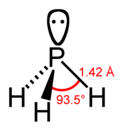A biosignature (sometimes called chemical fossil or molecular fossil) is any substance – such as an element, isotope, molecule, or phenomenon – that provides...
83 KB (8,690 words) - 13:35, 15 October 2024
understanding selection processes, evolution, and the identification of biosignatures in astrobiology. The hypothesis was proposed by chemist Leroy Cronin...
17 KB (2,098 words) - 00:10, 22 September 2024
Zhuchang; Hu, Renyu; Bains, William (11 October 2019). "Phosphine as a Biosignature Gas in Exoplanet Atmospheres". Astrobiology. 20 (2) (published February...
39 KB (3,618 words) - 11:03, 15 November 2024
61 Cygni (section Object for biosignature research)
Groombridge 1618, and HD 156026 may be particularly good targets for future biosignature searches,' said Arney. Wikimedia Commons has media related to 61 Cygni...
50 KB (5,233 words) - 22:27, 19 October 2024
fossils. Some fossils are biochemical and are called chemofossils or biosignatures. Gathering fossils dates at least to the beginning of recorded history...
111 KB (11,442 words) - 09:07, 28 September 2024
view of a gene as an aperiodic crystal, provides a so-called "agnostic biosignature", a sign of life that does not presuppose any biochemistry. In other...
30 KB (3,326 words) - 22:14, 8 April 2024
environments in the Solar System and beyond, the search for planetary biosignatures of past or present extraterrestrial life, and the study of the origin...
110 KB (11,321 words) - 23:02, 15 November 2024
including an impactor in combination with a thermal drill to search for biosignatures that might be frozen in the shallow subsurface. Another proposal put...
132 KB (12,970 words) - 15:03, 13 November 2024
Life on Mars (section Possible biosignatures)
telescopic investigations and deployed probes, searching for water, chemical biosignatures in the soil and rocks at the planet's surface, and biomarker gases in...
212 KB (20,667 words) - 07:34, 17 November 2024
possible 2450 Ma red alga from the Kola Peninsula, 1650 Ma carbonaceous biosignatures in north China, the 1600 Ma Rafatazmia, and a possible 1047 Ma Bangiomorpha...
33 KB (3,531 words) - 20:44, 29 October 2024






